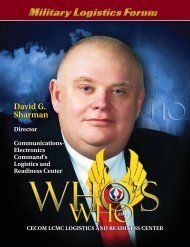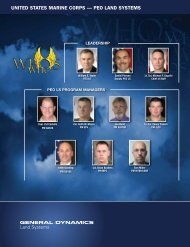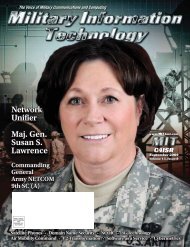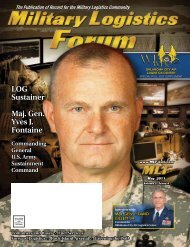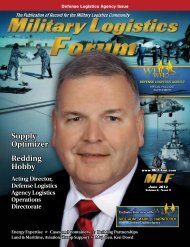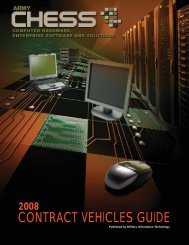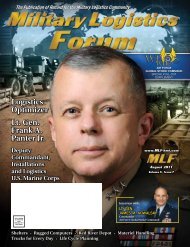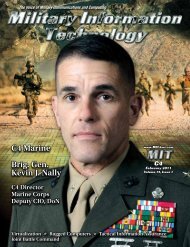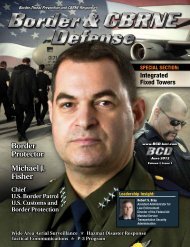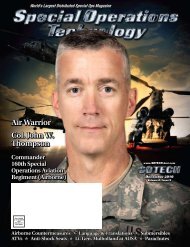Theater Logistician Maj. Gen. Kenneth S. Dowd - KMI Media Group
Theater Logistician Maj. Gen. Kenneth S. Dowd - KMI Media Group
Theater Logistician Maj. Gen. Kenneth S. Dowd - KMI Media Group
You also want an ePaper? Increase the reach of your titles
YUMPU automatically turns print PDFs into web optimized ePapers that Google loves.
that it is going into. The case<br />
is there to make up the difference<br />
between essentially<br />
an office environment and<br />
the field conditions of the<br />
real world this equipment<br />
winds up in.”<br />
That means cases such<br />
as the ones supplied by companies<br />
such as Zarges need<br />
to be able to protect nonruggedized<br />
gear from environmental<br />
factors such as<br />
rain, dust shock and vibration.<br />
According to Britton,<br />
“[The case] allows this stuff<br />
to be manhandled, and survive<br />
being tossed off the back<br />
of a Humvee, that sort of<br />
thing.” The HMMWV became<br />
the military’s prime mover in<br />
conflicts since Desert Storm<br />
because of its ability to traverse on- and off-road at considerable<br />
speeds over great distances. Cases needed to be developed that<br />
could “keep up” with the vehicle. “In the old days,” reiterates<br />
Britton, “a lot of this equipment was permanently mounted into<br />
trucks and trailers, and that provided the protection for it. After<br />
Desert Storm, we found that those large truck- and trailer-sized<br />
pieces of equipment couldn’t keep up with our forces; things<br />
had to be smaller, faster and more mobile.”<br />
Kevin Murphy, director of marketing communications<br />
with Pelican, agrees: “In Iraq and Afghanistan the equipment’s<br />
enemy is sand and dust. Once it gets into bearings, sleeves or<br />
hinges, it starts tearing gear up. You’ll find Pelican cases all<br />
over the theater of operations being used as storage containers,<br />
not just transport. That’s because the gear still needs to be protected<br />
from sand and dust, even while in storage.” He continued,<br />
“We’ve learned how to control the environment inside the<br />
case regardless of the conditions outside. For example, a government<br />
in Southeast Asia needed to protect parachutes from<br />
mold between operations, so our desiccant gel cartridge is used<br />
to absorb humidity in the case. And beyond the rubber o-ring<br />
seal, there is a pressure equalization valve. Every Pelican case<br />
allows air to breathe in and out of the case (to prevent vacuum<br />
lock), but the valve uses a Gore-Tex membrane to block water<br />
molecules from entering the case.”<br />
Ruggedized containers such as those described by Britton<br />
and Murphy are not usually purchased directly by the military<br />
as an empty case, but rather are purchased by the primary<br />
contractors, the Boeings, the <strong>Gen</strong>eral Dynamics, etc., and integrated<br />
into a system. Hardigg Industries has been working with<br />
the U.S. military for decades, designing and providing rugged<br />
protective cases to protect anything from weapons to medical<br />
gear. In January of this year Pelican purchased its longtime<br />
competitor Hardigg. The transaction, valued at approximately<br />
$200 million, is said to be the largest acquisition in the history<br />
of the protective case industry. The Hardigg brand name<br />
has been retained by Pelican, and Hardigg’s line of high-end<br />
roto-molded shipping cases will continue to be sold by Pelican.<br />
28 | MLF 3.7<br />
U.S. Army Sgt. Daniel Ponce of the 204th Brigade Support Battalion, guides the final storage container into place on the truck for the closure of Umm<br />
Qasr North, in Umm Qasr, Iraq. [Photo courtesy of U.S. Army]<br />
Hardigg’s cases have proved themselves over and over again in<br />
the unrelenting wind, heat, sand and dust storms of Iraq. All<br />
of Pelican’s case solutions, the original, virtually indestructible<br />
injection molded cases, and the newly acquired Hardigg<br />
roto-molded properties are airtight, watertight, sandproof<br />
and dustproof—a must in the Middle East. Speaking about<br />
the acquisition, Murphy said, “Here are two great companies,<br />
building their products in the USA, serving two ends of the<br />
same market. Pelican brings about 50 injection molded cases<br />
for personal use and weapons transport, Hardigg with over<br />
500 roto-mold sizes and an emphasis on custom solutions and<br />
heavy transport programs. Now we can connect the full scope of<br />
the military’s requirements, and make a difference that today’s<br />
warfighter will see.”<br />
As case manufacturers put it, when developing and deploying<br />
a military system, more often than not, the case is the last<br />
thing engineers and contractors think about. But the demand<br />
is always the same: Make it strong, but make it light. According<br />
to Britton, “We constantly are getting pushed for lighter and<br />
smaller. Obviously weight and volume drive shipping costs, drive<br />
manpower and personal requirements, so on and so forth.”<br />
Zarges sees aluminum as the answer to “tough but strong.”<br />
Other manufacturers such as Pelican and Hardigg rely on composites<br />
and plastics. “We concentrate on aluminum because it<br />
has the strength and the temperature resistance. The plastics<br />
are lower cost and some are just as strong [as aluminum],<br />
but they don’t have the range of temperature resistance,” said<br />
Britton.<br />
Someone who might disagree with Zarges’ approach is Jason<br />
Fletcher, marketing director of Oregon-based ECS Composites.<br />
“The military operates in the most extreme environments in the<br />
world. As such we need to design cases to meet those conditions<br />
and standards. That is why we use the reinforced composites<br />
to manufacture our cases. They perform well in those extreme<br />
temperatures, both hot and cold.<br />
Sterling Becklin, vice president of ECS, added, “We have<br />
three product lines today—two fiberglass lines and one<br />
www.MLF-kmi.com




